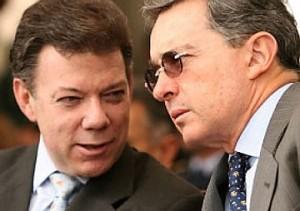During the last few months it has become apparent that a realignment of political forces could determine the political fortune of President Juan Manuel Santos's bid for a second term in next year’s presidential election and with him the prospects of a negotiated settlement. Of particular importance is the reemergence of the former president, Alvaro Uribe Velez, Santos's previous ally under whom he served as Defense Minister. Uribe has been a vocal opponent of Santos, objecting to his policy of land restitution and negotiations with the insurgency, and even championing a coalition of reactionary forces.

Uribe’s wide array of supporters stand to lose the most if Santos succeeds in returning the usurped lands to the original peasants owners in the municipalities of Cauca, Antioquia, Cordoba, Cesar, Bolivar, and Putumayo. Uribe is also enlisting the support of disgruntled military officers—active and retired—whom over the years have benefited from the process of land dispossession, who along with the landed elite, now feel that their interests may be also affected. The military has an even more important concern in that the likely price it will pay in a negotiated agreement with the insurgency is the cessation of a five–decade long conflict. Keep in mind that the military in Colombia has become the largest in Latin America thanks to a low-intensity civil war that translates to good salaries, handsome pensions, privileges, military resorts, and power, while peace might entail a cut in all of the above. The calculus for this sector is whether the costs of peace are higher than the continuation of this war.
That is why Uribe is capitalizing on the growing insecurity of the military that fears Santos's peaceful overtures. Uribe, in line of his class origins as an Antioquian cattle rancher with the political ethos of an hacendado, has an appeal among the recalcitrant landholders who oppose Santos's restitution plan. With these two groups—cattle ranchers and the military—Uribe has enough political support to make Santos's remaining year a very difficult one. Particularly now that guerrillas have stepped up military operations in various municipalities including the Cauca, where the FARC managed to sustain an attack for over two days and then allegedly shot down a Super Tucano fighter jet, further embarrassing President Santos while he was holding a council meeting a few miles away.
Although shaken by Uribe and the reinvigoration of the FARC, which incidentally started in 2008 under Uribe’s watch, the political situation of Santos still has a chance to build enough support for a negotiated settlement and restituting at least some of the land to disposed owners.
Nazih Richani is the Director of Latin American studies at Kean University. He blogs at nacla.org/blog/cuadernos-colombianos.

